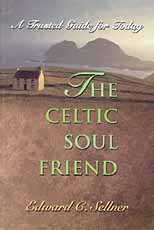"One of the greatest works of Welsh spiritual literature is the poem ‘The Loves of Taliesin,’ which shows vividly the breadth and depth of the Christian Celts’ understanding and appreciation of beauty, wherever it is found:
”The beauty of a companion who
does not deny me his company . . .
Beautiful too a man who is noble, kind and generous.
The beauty of berries at harvest time,
Beautiful too the grain on the stalk.
The beauty of the sun, clear in the sky. . . .
The beauty of desire and a silver ring. . . .
The beauty of an eagle on the shore when tide is full,
Beautiful too the seagulls playing. . . .
The beauty of a proper and perfect wedding feast,
Beautiful too a gift which is loved. . . .
The beauty for a minstrel of mead at the head of the hall,
Beautiful too a lively crowd surrounding a hero. . . .
The beauty of the moon shining on the earth,
Beautiful too when your luck is good.
The beauty of summer, its days long and slow,
Beautiful too visiting the ones we love. . . .
The beauty of the garden when the leeks grow well,
Beautiful too the charlock in bloom. . . .
The beauty of the heather when it turns purple,
Beautiful too moorland for cattle. . . .
The beauty of the fish in his bright lake,
Beautiful too its surface shimmering.
The beauty of the word which the Trinity speaks,
Beautiful too doing penance for sin. . . .
(quoted from Celtic Christian Spirituality
edited by Oliver Davies and Fiona Bowie (Continuum)
”In this poem we see how the ancient Celts’ love of the beauty of body, tribe, friendship, and nature is combined with Christian beliefs into an appreciation of another kind of beauty, one far more lasting than any physical beauty: the beauty of compassion, forgiveness, and wisdom, ultimately, the beauty of goodness itself.”
